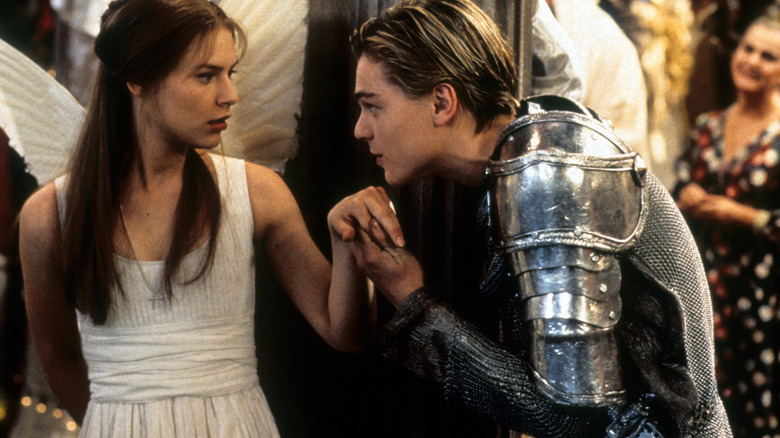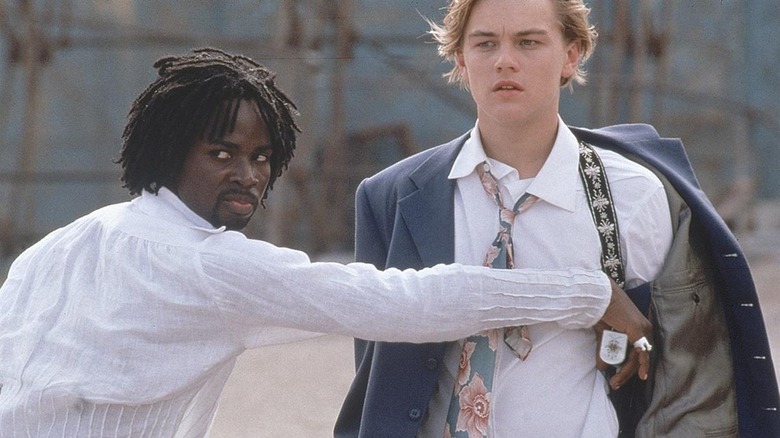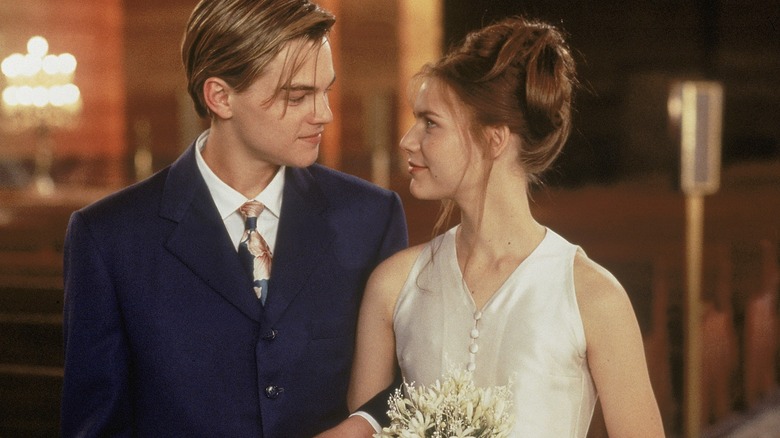Sickness, Storms, And A Kidnapping All Hit The Romeo + Juliet Set
Baz Luhrmann's "Romeo + Juliet" is an energetic retelling of Shakespeare's classic tale of star-crossed lovers. The film is brimming with passion and violence, but did you know that the film was just as chaotic behind the scenes as it was in front of the camera?
The 1996 film is set in the fictional Western city of Verona Beach, which resembles the debaucherous and colorful climate of Las Vegas. The Capulets and Montagues are rival crime families and their duels are dealt with handguns. When Mercutio (Harold Perrineau), a lovable drag queen, takes his friend Romeo Montague (Leonardo Dicaprio) to a costume party thrown by the Capulets, Romeo falls in love with his enemy's daughter, Juliet (Claire Danes). The resulting conflict leads to the death of Mercutio at the hands of Juliet's cousin, Tybalt (John Leguizamo).
The dramatic moments of the script are punctuated with creative liberties taken by Luhrmann. For instance, Romeo's magical experience at the party is enhanced with fireworks and psychedelics. Another example is Mercutio's tragic death and his curse on the Capulet and Montague houses, a climactic scene that is marked by a huge storm. Shockingly, the storm that so perfectly matched the tone of the scene was not a part of the plan.
A plague on the production
A hurricane actually struck the set of "Romeo + Juliet," destroying much of the production and taking the crew by surprise. In this unfortunate event, Luhrmann saw an opportunity to get wide shots of the storm's destruction. "For a budget like [Romeo + Juliet], you can't achieve that short of massive CGI," the director explained in Baz Luhrmann: Interviews.
The destructive storm was far from the most eventful thing to happen on set. Nearly everyone on set fell violently ill at one point or another. Luhrmann himself contracted a fever of over 110 degrees that caused production to shut down for a full week. But the illness was still only the tip of the iceberg.
According to Luhrmann, one member of the crew presented an unexpected production cost. "The hair and makeup person, Aldo Signoretti, who worked with Fellini, was kidnapped," the director revealed. The crew paid three hundred US dollars for his safe return, which Luhrmann "thought rather a bargain." His return was more or less in one piece but, as if the artist had not been through enough, the kidnappers "threw Aldo out of the car and broke his leg."
Everyone and everything adapted perfectly
"Romeo + Juliet" is a cinematic adaptation that captures the youthful and hedonistic essence of a centuries-old text in a way that no other adaptation has. The film feels like a fever dream because the entire cast and crew was feverish during production. The film is deeply suspenseful because there was real crime happening behind the scenes. The storm perfectly encapsulates the turbulent nature of the film and it caught the production completely by surprise.
Luhrmann attributes much of the film's success to the team's ability to adapt to the increasingly perilous conditions of the shoot. "The reason the film is like it is, is that we embraced everything that happened," Luhrmann explained. The "Elvis" director transformed each challenge into an opportunity on the set of "Romeo + Juliet." The 1996 film is not just an updated take on a classic. It incorporates the maximalism, consumerism, and sickly haze of the modern West to accentuate elements of a timeless tale that has never been so poignantly explored.


